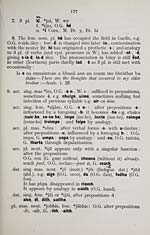Matheson Collection > Gaelic grammar, containing the parts of speech and the general principles of phonology and etymology, with a chapter on proper and place names
(196)
Download files
Complete book:
Individual page:
Thumbnail gallery: Grid view | List view

176
§ 121. Remarks on the Cpd. Personal Pronouns.
cf. Ped. II. 167.
1. 1 sing, mi /.
The Indqeuropean 1st pers. pronoun (e.g. L. ego, Gk. eyw,
Sk. aham) does not appear in the nom. in the Celtic languages.
me is an ace. like Gk. /te, and the dat. *moi is assumed. The
gen. mene, inferred from O. SI. mene was assumed as reduplicated
meme (Sk. mama of me), and goes back to *mewe, *mowe (Corn,
ow), G. mo my.
2. 2 sing, tu, thu thou.
The old Indoeur. nom., L. tu, Gk. (doric) tv, is retained in G.
tu. The W. ti thou, rests on ace. te < *twe, Gk. o-c.
The gen. *towe, *tewe, Sk. tava of me, gives G. to thy : under
the stress, t' athair— ^%^ father ; as proclitic it becomes do, do
mhàthair — thy mother.
3. 1 and 2 pi. sinn we : sibh ye, you.
The Indo^european nominatives (e.g. Sk. vayam we, yuyam j'Om)
are lost in Celtic, and are replaced by oblique cases as in Sk.
nas us, L. nos; and Sk. vasj'OM, L. vos. sinn ive (O.G. snisni), and
sibh you (O.G. sini, sib) are reduplicated, but the intensive par-
ticles -ni (sinn-ne) and -si (sibh-se) are simple. Hence the original
forms were probably *snès, *swes ; or regard being had to the -u-
timbre of -nn in sinn we, the forms *snos, *swes ; or *snos, *swes,
L. noster, vester, may be postulated.
4. ar n- our ; bhur n-, ur n- (O.G. bar, far) your.
The old independent genitives athar, ar our, sethar, sar your,
have comparative endings like L. nostrum, vestrum, Goth, unsara,
izwara, but they do not directly represent ancient forms.
*nserom, sweserom < esar (unstressed asar), sear, may be assumed
as the origin of the G. ar n- our, urn- your.
5. In 1 and 2 sing, the suffixed -m and -t are broad except in
the case of do + tu which is now often written duit ; and of 1 sing,
only domh is aspirated. In 1 and 2 pi. -nn and -bh are slender,
and -b -bh is aspirated throughout.
6. 3 sing. Nom. sing. mas. G. e, se, he, O.G. he (lengthened),
L. is, Goth is. Gk. Its one, *sem-s, a^ia together.
nom. sing, fem., G. i, si she, Ir. si, W. hi.
-V nom. sing, neut, G. eadh it, *id, earlier ida, O.G.
ed, L. id, Goth. ita.
§ 121. Remarks on the Cpd. Personal Pronouns.
cf. Ped. II. 167.
1. 1 sing, mi /.
The Indqeuropean 1st pers. pronoun (e.g. L. ego, Gk. eyw,
Sk. aham) does not appear in the nom. in the Celtic languages.
me is an ace. like Gk. /te, and the dat. *moi is assumed. The
gen. mene, inferred from O. SI. mene was assumed as reduplicated
meme (Sk. mama of me), and goes back to *mewe, *mowe (Corn,
ow), G. mo my.
2. 2 sing, tu, thu thou.
The old Indoeur. nom., L. tu, Gk. (doric) tv, is retained in G.
tu. The W. ti thou, rests on ace. te < *twe, Gk. o-c.
The gen. *towe, *tewe, Sk. tava of me, gives G. to thy : under
the stress, t' athair— ^%^ father ; as proclitic it becomes do, do
mhàthair — thy mother.
3. 1 and 2 pi. sinn we : sibh ye, you.
The Indo^european nominatives (e.g. Sk. vayam we, yuyam j'Om)
are lost in Celtic, and are replaced by oblique cases as in Sk.
nas us, L. nos; and Sk. vasj'OM, L. vos. sinn ive (O.G. snisni), and
sibh you (O.G. sini, sib) are reduplicated, but the intensive par-
ticles -ni (sinn-ne) and -si (sibh-se) are simple. Hence the original
forms were probably *snès, *swes ; or regard being had to the -u-
timbre of -nn in sinn we, the forms *snos, *swes ; or *snos, *swes,
L. noster, vester, may be postulated.
4. ar n- our ; bhur n-, ur n- (O.G. bar, far) your.
The old independent genitives athar, ar our, sethar, sar your,
have comparative endings like L. nostrum, vestrum, Goth, unsara,
izwara, but they do not directly represent ancient forms.
*nserom, sweserom < esar (unstressed asar), sear, may be assumed
as the origin of the G. ar n- our, urn- your.
5. In 1 and 2 sing, the suffixed -m and -t are broad except in
the case of do + tu which is now often written duit ; and of 1 sing,
only domh is aspirated. In 1 and 2 pi. -nn and -bh are slender,
and -b -bh is aspirated throughout.
6. 3 sing. Nom. sing. mas. G. e, se, he, O.G. he (lengthened),
L. is, Goth is. Gk. Its one, *sem-s, a^ia together.
nom. sing, fem., G. i, si she, Ir. si, W. hi.
-V nom. sing, neut, G. eadh it, *id, earlier ida, O.G.
ed, L. id, Goth. ita.
Set display mode to: Large image | Transcription
Images and transcriptions on this page, including medium image downloads, may be used under the Creative Commons Attribution 4.0 International Licence unless otherwise stated. ![]()
| Permanent URL | https://digital.nls.uk/76602337 |
|---|
| Description | Items from a collection of 170 volumes relating to Gaelic matters. Mainly philological works in the Celtic and some non-Celtic languages. Some books extensively annotated by Angus Matheson, the first Professor of Celtic at Glasgow University. |
|---|
| Description | Selected items from five 'Special and Named Printed Collections'. Includes books in Gaelic and other Celtic languages, works about the Gaels, their languages, literature, culture and history. |
|---|

